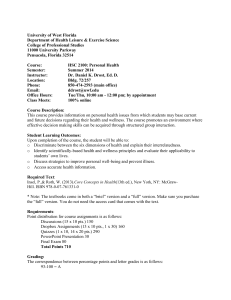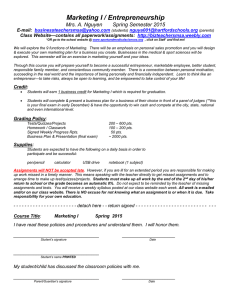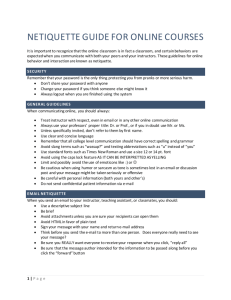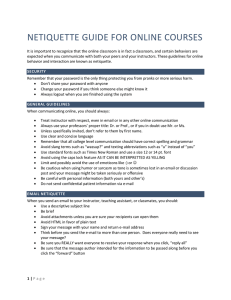Psyx 120: Introduction to Research Methods
advertisement
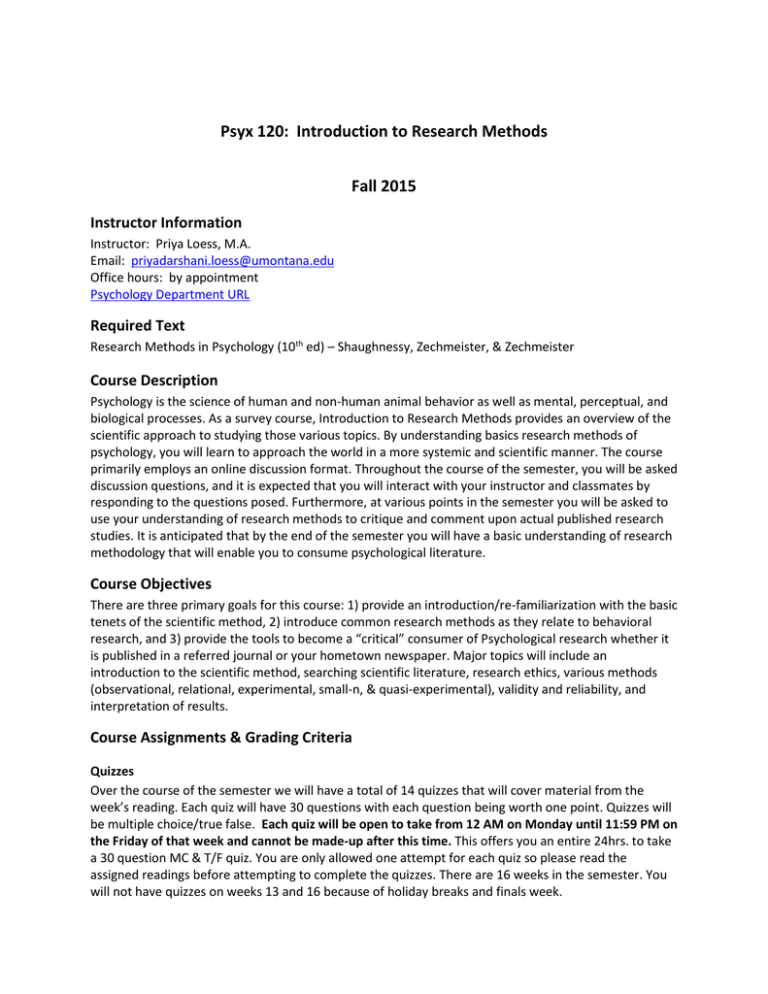
Psyx 120: Introduction to Research Methods Fall 2015 Instructor Information Instructor: Priya Loess, M.A. Email: priyadarshani.loess@umontana.edu Office hours: by appointment Psychology Department URL Required Text Research Methods in Psychology (10th ed) – Shaughnessy, Zechmeister, & Zechmeister Course Description Psychology is the science of human and non-human animal behavior as well as mental, perceptual, and biological processes. As a survey course, Introduction to Research Methods provides an overview of the scientific approach to studying those various topics. By understanding basics research methods of psychology, you will learn to approach the world in a more systemic and scientific manner. The course primarily employs an online discussion format. Throughout the course of the semester, you will be asked discussion questions, and it is expected that you will interact with your instructor and classmates by responding to the questions posed. Furthermore, at various points in the semester you will be asked to use your understanding of research methods to critique and comment upon actual published research studies. It is anticipated that by the end of the semester you will have a basic understanding of research methodology that will enable you to consume psychological literature. Course Objectives There are three primary goals for this course: 1) provide an introduction/re-familiarization with the basic tenets of the scientific method, 2) introduce common research methods as they relate to behavioral research, and 3) provide the tools to become a “critical” consumer of Psychological research whether it is published in a referred journal or your hometown newspaper. Major topics will include an introduction to the scientific method, searching scientific literature, research ethics, various methods (observational, relational, experimental, small-n, & quasi-experimental), validity and reliability, and interpretation of results. Course Assignments & Grading Criteria Quizzes Over the course of the semester we will have a total of 14 quizzes that will cover material from the week’s reading. Each quiz will have 30 questions with each question being worth one point. Quizzes will be multiple choice/true false. Each quiz will be open to take from 12 AM on Monday until 11:59 PM on the Friday of that week and cannot be made-up after this time. This offers you an entire 24hrs. to take a 30 question MC & T/F quiz. You are only allowed one attempt for each quiz so please read the assigned readings before attempting to complete the quizzes. There are 16 weeks in the semester. You will not have quizzes on weeks 13 and 16 because of holiday breaks and finals week. Lab Assignments There will be four lab assignments throughout the course of the semester. They will ask you to apply the material that you have learned to critiquing and commenting original research articles, as well as identifying and responding to methodological scenarios. They are described in full detail under “Labs” and are available for review before the week that they are due. There are four lab assignments across the semester, and they are worth 40 points each. See course schedule for due dates. Discussion Forums Almost every week throughout the duration of the semester, one discussion forum will be created based on the week’s readings. Discussion forums will be opened at the beginning of the week (Monday at 12 AM) and will close on Thursday at 12 PM, noon. Students will be expected to make an original post and three replies (to other student’s posts) in each discussion forum during that allotted time. In other words, don’t wait for the end of the semester to make 28 posts and 28 replies; you must submit two posts and two replies every week if you want the credit. Please attend to the quality of your discussion post because the instructor reserves the right to not give you credit for unsatisfactory posts. For example, simply stating “I agree” or some variation is not a satisfactory reply to another student’s post. Responses to discussion posts are expected to help you explain, analyze, synthesize and evaluate basic concepts in psychological research methods. Additionally, through interacting with your peers it is anticipated that you will develop a better understanding of the material covered. You will be expected to make 14 original posts and 42 replies throughout the semester. Each discussion is worth 30 points. There are 16 weeks in the semester. You will not have discussion posts on weeks 13 and16 because of holiday break and finals week. Grades are based on (1) attendance and (2) quality of your posts and do not include any posts made in the “Q & A” or “Welcome” Discussions. Full credit requires high quality and maximum frequency posts. The two charts below explain how your discussion posts are graded. ATTENDANCE GRADING (30 points possible) Students must post (respond) a minimum of three separate days per week. You can post more than three days, and post more than three times, but at a minimum, you must post on three separate days. 3 days 30 points 2 days 1 day 0 days 20 points 10 points 0 points Once the number of days is calculated, students are then graded based on their contributions to the discussion. The following points are deducted, not added, from the points earned above, to yield a final weekly “attendance” score. (Students cannot earn negative points. The lowest possible score is zero.) Students must make a post to the discussion question in the weekly discussion forum. Each weekly discussion question post will be due by Friday Each day late 2 pts lost Students must post (respond) to a minimum of three of their 3 peers 0 pts lost peers. You can post to more than three, but at a minimum, you must reply to three of your peers. This promotes student engagement with each other, rather than just responding to the discussion questions posted by the instructor 2 peers 3 pts lost 1 peer 6 pts lost 0 peers 9 pts lost Once I have calculated your final weekly “attendance” score, then I grade the quality of your posts, as explained below. Again, the following points are deducted, not added, from the final weekly “attendance” score, to yield a final weekly “Discussion” score. (Students cannot earn negative points. The lowest score is a zero.) QUALITY GRADING Students must to make detailed and thoughtful posts that reflect an appropriate application of emerging knowledge and vocabulary in the topic area. Each post must add value to the discussion and be related to the required readings for the week. Below are additional details of how I grade the quality of your posts. Superior 0 pts lost Above Average 4 pts lost Average 8 pts lost Below Average 12 pts lost Unacceptable 16 pts lost Superior: Your contributions demonstrate a complete mastery of the materials assigned. Your responses might integrate multiple views and/or show strong analysis and reflection on topics and other student’s posts. You provide evidence that you are reading the assigned materials and other student postings and are responding accordingly, bringing out interesting interpretations. You know the facts and are able to analyze them, apply them to real life scenarios and handle conceptual ideas. It is highly unlikely that you could get full credit in less than two paragraphs. Above Average: Your responses build on the ideas of other participants and dig deeper into assignment questions or issues. When you make intelligent posts during the week, including some good critique of the course material, then you have demonstrated you have an understanding of the material, are reading posts of your colleagues, and are contributing to the class. Your posts demonstrate confidence with the materials, but may be just a bit off target in one area or another. Average: You have meaningful interaction with other participants' postings. Posts that state, “I agree” or “I disagree” and include a detailed explanation of what is disagreed or agreed upon and why, or introduce a perspective or concept that adds to the discussion. However, you may have rambling, lengthy posts with no clear point, your writing has a lack of clarity and comprehension, or there are considerable typos and grammatical errors. Below Average: You answer questions asked by me or other students but do not expand upon your response or you answer questions based only on your opinion, rather than on research or proper evidence. Your posts are unusually short (one paragraph or less) and you fail to demonstrate a clear working knowledge of the material covered for the week. Unacceptable: You will receive little credit in the week's discussion by just showing up and making trivial comments, without adding any new thought to the discussion. At the low end of the spectrum, no participation gets a "0." If you are not in the discussion, you do not earn any points. Comments such as “I agree” or other one-sentence responses will result in zero points. Copying and pasting from a website without providing your own substantial insight is also an unacceptable post- even if you have properly cited your sources. This assignment is an assessment of your understanding of the information covered in this class. Copying and pasting from websites does not demonstrate a working knowledge of the material. Special Note: I check very carefully for plagiarism in the discussion posts. If you have plagiarized, you will get a zero for the entire assignment. If you plagiarize a second time, you will fail the course. If you engage in flaming behavior in the posts, you will get a zero for the entire assignment. Course Grading Your final grade for the course will consist of scores on weekly quizzes, discussion posts, and lab exercises. Your final grade is the percentage of the total points earned divided by total possible points. There is no course curve in this class. The following chart breaks down the points for each assignment type. Criteria Quizzes (14, at 30 pts ea) Discussion Posts (14, at 30 pts ea) Lab Exercises (4, at 40 points each) Total Points Points possible 420 points possible 420 points possible 160 points possible 1000 points possible The following chart shows the Grade scale for the Final Course grade. Final Course Grade A B C D F # Points 895 – 1000 795 – 894 695 – 794 595 – 694 0 – 594 Percentage 89.5% - 100% 79.5% – 89% 69.5% – 79% 59.5% – 69% < 59.5% Course Guidelines and Policies Contacting me Please email me with questions/concerns. I will do my best to respond to you as quickly as possible, but please allow up to, but no later than, 48 hours for me to respond. Announcements Students are responsible for all announcements made in class. These may include changes in policy, due dates, or assignments requirements. Announcements are posted in the announcements section of the course or are directly emailed to the students. Technology Policies Please contact UM Online if you experience technical difficulties. Though I would love to be able to help, I am not qualified to do so. Critical note: I do not allow technical issues for not having the proper software as reasons for late or incomplete work. To ensure your protection, please keep technical support contact information available offline and please do not wait until the last minute to complete your work each week! To access technical support (and save their contact information offline) please click on the “Tech Support” link to the left of the page. Technical Alternatives Also, keep in mind your technical alternative if you have computer difficulties. If you live near the University, campus computers are an option. Otherwise, consider the public library, an internet café, a computer at work, or a friend or family member’s computer. Have a plan of action in mind so that you can complete the required work each week if an issue arises. Assignment Due Dates, Late Work, and Make-up Work Assignments are due every week on Friday by 11:55pm MST. Please be sure to start your assignments early enough to complete them by the time the week closes. As a rule, I do not accept late work or allow make-up work, except for one “freebie.” No reason is required to take advantage of this opportunity, and it is the student’s responsibility to contact the instructor to make this happen. Students have 24 hours to make up the work from the time I send the make-up assignment email, and students are not permitted to use the “freebie” at any time during finals week. Aside from this one freebie, no extra points will be given and no extra credit will be assigned. Students cannot, under any circumstance, make up the discussion posts assignment. Due to the interactive nature of this assignment, students must be engaged in this process throughout the week each week in order to receive credit. To make up multiple missed assignments it is mandatory that you 1) notify your instructor before the time of the assignment and 2) provide proper documentation verifying the reason for your absence. Examples of proper documentation include a medical note or a death or family emergency. Remember, prior notification and documentation is mandatory! You can provide documentation by 1) scanning and emailing documents, 2) mailing the documents, or 3) bringing them by my office during office hours. I do not allow students to make up work until I have received the proper documents. I do not allow make up work during the week of final exams. Grades of Incomplete Departmental and university policies regarding incompletes do not allow changing “incomplete” grades after one year has passed since the “I” was granted. Academic Misconduct All students must practice academic honesty. Academic misconduct is subject to an academic penalty by the course instructor and/or a disciplinary sanction by the University. All students need to be familiar with the Student Conduct Code. Plagiarism The Student Conduct Code discusses plagiarism. However, it is a serious offense worth re-mentioning. This course requires students to adhere to APA format when citing, paraphrasing, or referencing sources. If you have plagiarized, either intentionally or accidentally, you will receive a zero on the entire assignment. If you plagiarize a second time, you will fail the course. Netiquette Students must engage in proper “netiquette.” Netiquette or “network etiquette” is a professional and mannerly way of communicating with others in the online medium. Failure to engage in proper netiquette will result in earning a zero for each assignment where an incident has occurred. Disability Modifications The University of Montana assures equal access to instruction through collaboration between students with disabilities, instructors, and Disability Services for Students. If you think you may have a disability adversely affecting your academic performance, and you have not already registered with Disability Services, please contact Disability Services in Lommasson Center 154 or call 406-243-2243. I will work with you and Disability Services to provide an appropriate modification. Dropping/Adding/Changing grade option Please refer to the Registrar’s Office webpage for information and policies. Mandatory Employee Reporting of Sex-bases Discrimination, Sexual Harassment, and Sexual Misconduct Involving Student In order to enable the University to respond effectively and to stop instances of sex-based discrimination, sexual harassment and sexual misconduct involving students at the University proactively, all University employees must, within 24 hours of receiving the information, report information they have about reported sex-based discrimination, sexual harassment, and sexual misconduct involving students to the EO. The information given to the EO must include all relevant details needed to determine what occurred and to resolve the situation. This includes the names of the respondent (if known), the complainant, other students involved in the incident, as well as relevant facts, including the date, time, and location. Tentative Course Schedule Week + Units Readings Week 1 (8/31 - 9/5) How to be an Online Student Netiquette Guidelines Washull, 2005 Quizzes & Discussions Week 1 Discussion Week 1 Quiz Assignments 1post; 3replies; 1quiz Week + Units Readings Week 2 (9/7 – 9/11) General Issues Week 3 (9/14 - 9/18) General Issues Week 4 (9/21 - 9/25) General Issues Introduction, Chapter 1 Week 5 (9/28 - 10/2) Descriptive Methods Week 6 (10/5 – 10/9) Descriptive Methods Week 7 (10/12 - 10/16) Experimental Methods Week 8 (10/19 - 10/23) Experimental Methods Observation, Chapter 4 Week 9 (10/26 - 10/30) Experimental Methods Week 10 (11/2 – 11/6) Applied Research Week 11 (11/9 – 11/13) Applied Research Week 12 (11/16 – 11/20) Analyzing and Reporting Research Week 13 (11/23 – 11/27) Week 14 (11/30 – 12/4) Analyzing and Reporting Research Week 15 (12/7 – 12/11) Analyzing and Reporting Research Week 16 (12/14 – 12/18) Finals Week Complex Designs, Chapter 8 The Scientific Method, Chapter 2 Ethical Issues in the Conduct of Psychological Research, Chapter 3 Survey Research, Chapter 5 Independent Group Designs, Chapter 6 Repeated Measures Designs, Chapter 7 Quizzes & Discussions Week 2 Discussion Week 2 Quiz Week 3 Discussion Week 3 Quiz Week 4 Discussion Week 4 Quiz Week 5 Discussion Week 5 Quiz Week 6 Discussion Week 6 Quiz Week 7 Discussion Week 7 Quiz Week 8 Discussion Week 8 Quiz Assignments 1post; 3replies; 1quiz 1post; 3replies; 1quiz 1post; 3replies; 1quiz Lab #1 due 1post; 3replies; 1quiz 1post; 3replies; 1quiz 1post; 3replies; 1quiz 1post; 3replies; 1quiz Lab #2 due 1post; 3replies; 1quiz 1post; 3replies; 1quiz 1post; 3replies; 1quiz 1post; 3replies; 1quiz Lab #3 due Single-Case Research Designs, Chapter 9 Quasi-Experimental Designs and Program Evaluation, Chapter 10 Data Analysis and Interpretation: Part I, Chapter 11 Week 9 Discussion Week 9 Quiz Week 10 Discussion Week 10 Quiz Week 11 Discussion Week 11 Quiz Week 12 Discussion Week 12 Quiz Enjoy the break!! Data Analysis and Interpretation: Part I & II, Chapter 11 & 12 Week 14 Discussion Week 14 Quiz 1post; 3replies; 1quiz Data Analysis and Interpretation: Part II, Chapter 12 Week 15 Discussion Week 15 Quiz 1post; 3replies; 1quiz Lab # 4 due
